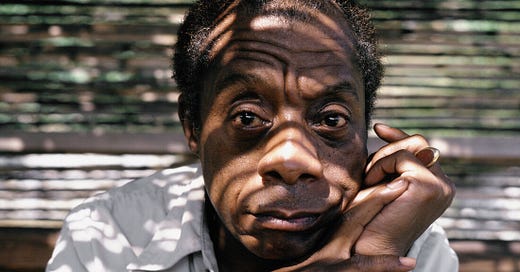James Baldwin on Film and in Print, in Honor of His Centennial
Baldwin's work continues to be recognized by modern scholars as speaking to the issues of today.
James Baldwin would’ve turned 100 this year and he is still yet to receive the same notoriety as others from the 1960s who populate our textbooks.
Terence Dixon’s 1970 documentary Meeting the Man: James Baldwin in Paris gives us a glimpse into the civil rights activist’s raw and powerful rhetoric in what can be argued to be its purest form. In the film, the dynamic between Baldwin, Dixon, and others are what propel Baldwin’s character as both a renowned writer and grounded brother to many into a space where he captures the attention of the audience and doesn’t let go, whether he’s talking directly to the camera or not. “Provoke” isn’t the right word because Baldwin is in complete control of himself, but I wonder to what extent these documentarians purposefully created tension so the film’s subject could prove just how complex and nuanced of a mind he has. Regardless of how real the frustration behind the camera was, the product speaks for itself in the same way Baldwin explains his writings do.
On September 25, I reported on Adelphi University’s Center for African, Black and Caribbean Studies’ event “The Fire This Time: The Lasting Impact of James Baldwin's Writings,” at the campus’ University Center. The panel discussed the themes and issues raised by Baldwin’s 1963 text “The Fire Next Time,” and my coverage can be found by clicking here.
An excerpt:
“The panelists brought many modern characteristics of American society into the conversation, saying that even today the country is still facing educational setbacks, noting Florida’s controversial history curriculum. However, their discussion reflected Baldwin’s ‘optimistic’ grace, encouraging the 42 attendees to seek out more of his work, which offers a perspective of the civil rights movement that somewhat differs from those of some of the most well-known civil rights leaders in the 1960s.
“[Coordinator for Programming and Community Engagement for the Center for African, Black and Caribbean Studies, Fabian] Burrell explained that Baldwin’s first book, ‘Go Tell It On The Mountain,’ was published in 1953 in Paris, where he had exiled himself because he could not write in Harlem, New York and the United States.
“‘He had to free himself from the bombardment of racism, his identity crises confronting his homosexuality and the homophobia in society, his religious upbringing, and the frightening terrorism that reigned down on his people — Black people,’ she said. ‘Although he was a very outspoken critic of the government and its policies, he still managed to find allies amongst our world leaders — President John F. Kennedy, for example — for his discourse, which allowed his activism to take root. He used his pen to advocate for justice.’”
11/8/24





